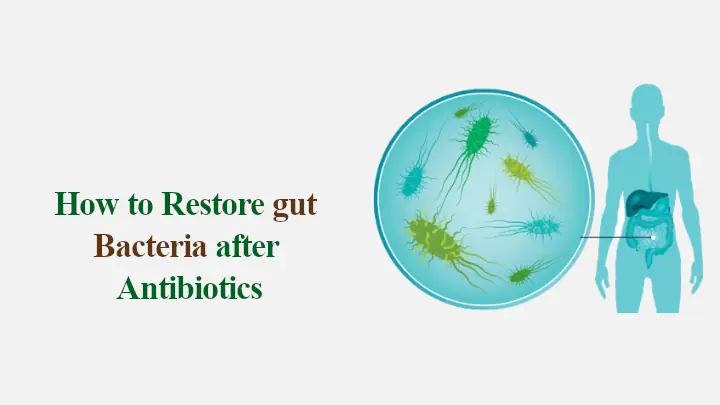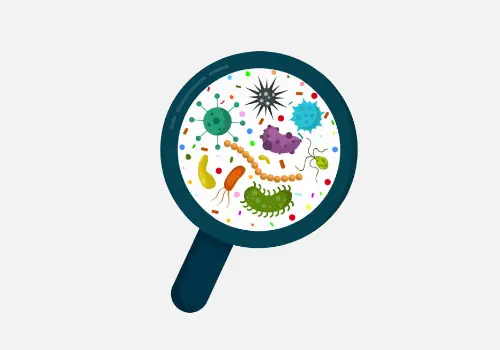How to Restore gut Bacteria after Antibiotics

You might wonder how to restore your gut bacteria if you recently took antibiotics. Antibiotic use can alter the ratio of healthy to unhealthy bacteria in your digestive system, resulting in uncomfortable symptoms like bloating and diarrhea. Luckily, you can do a few things to help your gut bacteria balance out again after taking antibiotics!
Consuming probiotics and prebiotics, eating a nutritious diet, and making other lifestyle changes supporting gut health are all examples. In this article, we will explore in more detail the various strategies that can be used to restore gut bacteria after taking antibiotics, helping to promote digestive health and overall well-being.
In This Article
How to Restore gut Bacteria after Antibiotics
When you have an infection, antibiotics are strong medicines that can help eliminate harmful bacteria from your body. These can, however, harm the beneficial microorganisms in your gut. Here are seven methods for restore stomach bacteria after antibiotics use:

1. Consume Fermented foods
Fermented foods such as kefir, sauerkraut, kimchi, yogurt, and miso contain live bacteria that can restore gut bacteria. These foods have been utilized for centuries to assist digestion and promote general health.
Probiotics, which are helpful bacteria that can help restore the balance of gut bacteria following antibiotics, are found in fermented foods. Choose fermented foods that have not been pasteurized, as the pasteurization process might kill beneficial bacteria.
2. Start Taking a Probiotic Supplement
Probiotic supplements contain beneficial bacteria that can restore gut bacteria balance following antibiotic use. When choosing a probiotic supplement, look for one with a range of bacterial strains, as each strain performs a different function within the body.
Seek a probiotic supplement with at least 10 billion colony-forming units (CFUs) per serving. Following the supplement manufacturer’s directions for use is also critical, as certain probiotics must be refrigerated or taken on an empty stomach.
3. Consume Prebiotic foods
Prebiotic foods, promote the growth of good bacteria in the gut. Prebiotics foods are garlic, onions, leeks, asparagus, and bananas. These foods must include in our diet.
Prebiotics are a form of fibre that helps the healthy bacteria in your stomach grow and multiply. Consuming a range of prebiotic foods can help improve gut health and general wellness.
4. Sugar and Processed foods should be Avoided
Sugar and processed foods can promote bad bacteria in the gut, making it difficult for good bacteria to develop. Too much sugar can produce excess harmful bacteria in the gut, causing digestive disorders and other health problems. Preservatives and artificial additives in processed foods can also disrupt the equilibrium of gut microorganisms.
5. Do Regular exercise
Exercise can help improve gut health by improving blood flow to the digestive system and encouraging the growth of probiotic bacteria.
Exercise regularly can also help minimize inflammation in the body, which can enhance general health. To promote gut health, aim for at least 30 minutes of moderate-intensity exercise most days.
6. Reduce Anxiety and Stress
Stress can harm gut health by upsetting the equilibrium of microorganisms in the stomach. Prolonged stress can produce inflammation in the body, leading to digestive disorders and other health concerns.
To enhance gut health, engage in stress-relieving activities such as meditation, yoga, or deep breathing exercises.
7. Get enough Sleep
Sleep is essential for maintaining healthy gut bacteria. Sleep deprivation can upset the equilibrium of gut bacteria, resulting in digestive issues.
Aim for 7-8 hours of decent sleep per night to aid in restoring gut bacteria following antibiotic use. Having a bedtime routine and refraining from coffee and alcohol before bed can help improve sleep quality.
Following these simple steps regularly after taking antibiotics can help rebalance our intestinal flora back towards its natural state – restoring optimal microbial diversity and improving digestive health simultaneously!
Foods to Heal gut After Antibiotics
After taking antibiotics, eating foods that help heal and restore the gut is important. Here are some foods that can be beneficial:
- Fermented foods like kefir, sauerkraut, and kimchi
- Prebiotic foods like garlic, onions, and asparagus
- Bone broth
- Probiotic-rich foods like yogurt, tempeh, and miso
- Fibre-rich foods like fruits and vegetables
- Anti-inflammatory foods like turmeric, ginger, and leafy greens
- Healthy fats like avocado, nuts, and seeds
These foods can help support the growth of beneficial gut bacteria, reduce inflammation, and promote overall gut health. It’s also important to avoid processed foods, sugar, and alcohol, which can harm the gut microbiome.
Q. How long does it take to Restore good gut Bacteria after Antibiotics?
Ans- The time it takes to recover from medicines and rebuild beneficial gut bacteria varies, but it usually takes several weeks to many months. A nutritious diet, probiotic supplements, and an active lifestyle can help heal.
Q. What to eat to restore gut bacteria after antibiotics?
Ans- To restore gut bacteria after antibiotics use, we should eat fermented foods like kefir and sauerkraut, prebiotic foods like garlic and onions, bone broth, and probiotic-rich foods like tempeh and pickles. Sugar and processed foods, which can disrupt gut microorganisms, should be avoided.
Q. How to restore good bacteria after Antibiotics?
Ans- Consume fermented foods, prebiotic foods, probiotic supplements, and bone broth to restore healthy bacteria following antibiotics, and avoid processed foods, sweets, and alcohol.
A healthy lifestyle that includes regular exercise, stress management, and enough sleep can also help beneficial gut flora grow.
Conclusion
In conclusion, antibiotics can disturb gut bacteria by killing off beneficial bacteria, resulting in various health problems. To rebuild gut bacteria after antibiotics, eat a nutritious diet rich in fermented and prebiotic foods, bone broth, and probiotic supplements.
A healthy gut flora can also be maintained by avoiding processed foods, sweets, and alcohol. Furthermore, a healthy lifestyle that includes regular exercise, stress management, and proper sleep might promote the growth of beneficial gut bacteria.
References
- Impact of antibiotics on the human microbiome and consequences for host health
- Effects of Antibiotics upon the Gut Microbiome: A Review of the Literature
- Recovery of gut microbiota of healthy adults following antibiotic exposure





